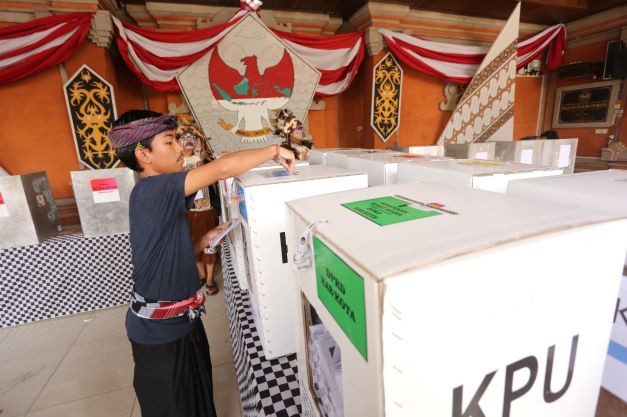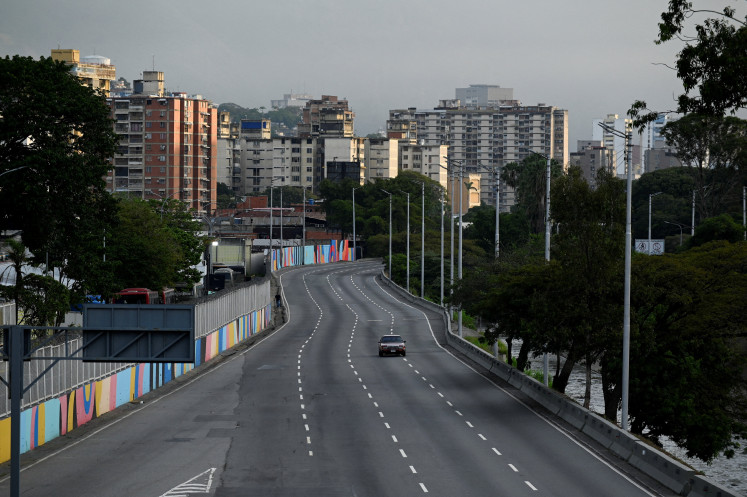Popular Reads
Top Results
Can't find what you're looking for?
View all search resultsPopular Reads
Top Results
Can't find what you're looking for?
View all search resultsIs delaying the elections legitimate and constitutional?
There are no constitutional provisions concerning how to extend the terms of office of legislators or the executive past their mandate. Nor does the Constitution authorize a state agency to extend the term of office of the executive or legislative branches.
Change text size
Gift Premium Articles
to Anyone
A
number of political party leaders have proposed the postponement of the 2024 elections for one or two years, claiming, among other reasons, the move would provide stability to the country amid the protracted COVID-19 pandemic and the impacts of the ongoing war in Ukraine.
Many have been quick to oppose the initiative, and President Joko “Jokowi” Widodo has asked the political elites to adhere to the Constitution, although he acknowledged that raising the idea was legitimate in a democracy.
From the constitutional law point of view, however, postponement of the elections is a violation of the Constitution. Article 22e paragraph 1 of the Constitution says elections are to be held once every five years and Article 167 paragraph 1 of Elections Law No. 7/2017 states that elections are to be held every five years to elect the president and vice president, as well as members of the House of Representatives, the Regional Representatives Council and regional legislatures.
From the lens of the Constitution, the election schedule is certain, so is the term of the president, vice president and legislators, who hold their posts for five years, after which another election is held to replace or keep them.
The postponement of the 2024 elections has no legal consequences for the term of office of the president, vice president or legislative council members either because once their terms end, there is no way to extend them except through elections. There are no constitutional provisions concerning how to extend the term of office of legislators or the executive past their mandate. Nor does the Constitution authorize a state agency to extend the term of office of the executive or legislative branches.
The consequences of delaying the elections will be overarching. Instead of bringing stability, as the politicians have argued, it will create a vacuum of power because all the legislative council members, the president and vice president will lose their mandate as soon as they complete their tenure. Some regional leaders may still govern in October 2024, but they would not be able to work effectively because of the absence of regional legislatures.
A power vacuum may lead to chaos that could eventually prompt the Indonesian Military (TNI) or the National Police to take action to prevent the political crisis from worsening. However, based on TNI Law No. 34/2004 and National Police Law No. 2/2002, the two are only responsible for defense, security and national order. If they go beyond their constitutional roles, such as by playing practical politics, democracy in the country will be in peril.
Worse, people will be divided, causing political instability and national disintegration. More than just unconstitutional, the proposal to postpone the elections is dangerous.
However, in the event of political deadlock, constitutional law provides a solution to ending the crisis. If and only if the aspiration to delay the elections becomes a unanimous agreement, amending the Constitution is the only legitimate way to realize it.
Constitutional law experts have introduced two models of constitutional amendments. The first is formal amendment in accordance with the provisions of Article 37 of the 1945 Constitution through the proposal of the House with approval from the People's Consultative Assembly. This path is sure to be full of ups and downs and not easy because it has to go through the deliberations of political parties and the broad aspirations of the people.
It is certain that this would lead to a long public debate. If the formal route is the most effective, it is certain that the text of the Constitution will change.
The second method is informal amendment through the interpretation of the meaning of constitutional norms by the judiciary or a judicial review by the Constitutional Court. This path does not change the text of the Constitution but rather changes the interpretation of constitutional norms according to the context of changing times.
If the constitutional amendment goes through a formal mechanism, then what needs to be amended are the provisions of Article 22e by adding a clause that sets three constitutional norms.
The first is regarding the legal reasons for postponing the elections. The amended Constitution must establish the legal reasons for an election to be postponed, for example due to a state of emergency, along with detailed criteria that do not spark multiple interpretations, such as natural and non-natural disasters, for example, the COVID-19 pandemic.
The second is regarding the procedure for postponing the elections. The amended Constitution must, for example, establish which institution the proposal will come from, where it will start, which institution will decide on the postponement, when the postponement can be proposed and how long it will last.
The third is regarding the status of the offices of the president, vice president and legislators whose terms of office have ended if the state has not been able to hold elections due to a crisis. It is necessary to regulate the granting of the status of acting executive and legislative officials who exercise their powers temporarily until the government can hold the next general election, and it is hoped that their positions would be constitutional in this case.
The second path is informal amendment through a judicial review by the Constitutional Court. The court can be asked to interpret the provisions of the 1945 Constitution to determine whether it is permissible for the election to be postponed if it is due to the pandemic or other states of emergency, as well as how to postpone it and how long the postponement should be.
The Constitutional Court's decision is final and erga omnes (applies to all citizens). Therefore, it is hoped that the Constitutional Court's decision will end the controversy about whether it is permissible to postpone the elections.
***
The writer is an associate professor of constitutional law at Sebelas Maret University (UNS) Surakarta.










